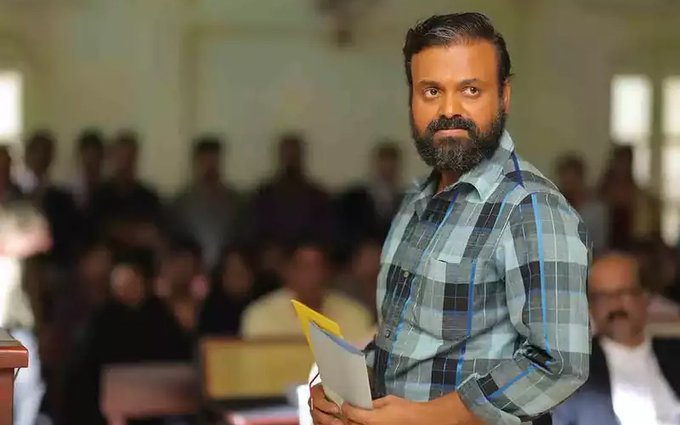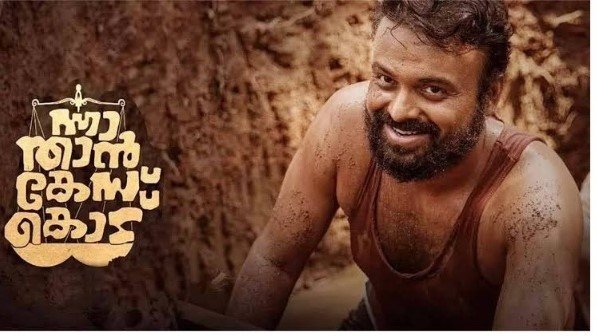Read in : தமிழ்
Every now and then a film that releases that comes as a whiff of fresh air, driving away the heady smells of masala for a few moments. And that film inevitably comes from our western neighbour.
Nna Thaan Case Kodu’ (If so, sue me) by Kunchacko Boban takes up an everyday difficulty and expands it to make us question our politics and our society itself. It puts forward a different perspective on what looks like a petty social-civic problem, bypassing the beaten tracks of Indian films steeped in archaic values.
A spark that sets off a conflagration
Kozhumal Rajeevan (Kunchacko Boban) escapes from Cheruvathur in north Kerala to Cheemeni to evade arrest in a theft case. On his way, he happens to meet Devi (Gayathri ) who is living with her father on the banks of a river. Over time, he becomes quite intimate with them so he is treated as a family member.
Before Rajeevan and Devi become a formal couple, she is pregnant with his baby. One day as he is away in an adjoining village attending a temple festival, he gets arrested on the charge of trying to commit theft in an MLA’s house. Pleading not guilty in court, he argues that as he was peeing near the compound wall of the MLA’s house, he tried to climb up the wall in order to avoid getting hit by an oncoming autorickshaw.
The film’s screenplay revolves around the common syndrome of how the ordinary people feel uncomfortable to file a case in the court or lodge a complaint with the police. The very colloquial title meaning ‘if so, file a case,’ is a lift from the street lingo, symbolically conveying a message that the content is germane to the man in the street
He blamed it all on the deep pit dug up on the road which he attributes to the PWD Minister. He argues his own case, not falling back on any lawyer. The case courses in such a way that at one point the minister has to be summoned to the court even as the protagonist is seriously trying to break free from what he calls the foisted case.
Like a tiny spark that slowly sets off a conflagration, what seems initially like an insignificant and petty case eventually turns serious ferreting out a minister’s corruption. It is this aspect that sets the ‘Nna Thaan Case Kodu’ a star apart.
Worth learning
Back in the 1980s, Tamil films such as ‘Sivappu Malli’, ‘Thanneer Thanneer’ dished out political messages. Even in 1960s, rare films such as ‘Paadhai Theriyuthu Paar’ projected laborers’ welfare. When Tamil cinema was just less than two decades old, films ‘Velaikkari’, ‘Parasakthi’ trumpeted Dravidian politics, the rage in the 1950s. During British rule, films capturing the spirit of the freedom struggle hit the screens. Even a few MGR films had some political content.
But this trend in Tamil cinema underwent a makeover after 1990s, showing political films as heroism-oriented stuff. Shankar’s ‘Indian’, ‘Mudhalavan’, Balaji Sakthivel’s ‘Samurai’ Sharavana Subbiah’s ‘Citizen’, Murugadoss’s ‘Ramana’ are more hero-oriented films of Robinhood-type daredevilry than sincere political flicks. Maniratnam’s works such as ‘Iruvar’, supposedly a biopic on MGR and Karunanidhi, was a bit of a sham since the politics and the movement was only a sham backdrop.
Of late, Tamil films highlighting the ruinous religious and casteist differences and decadence of the police and the government machinery are coming out. But they don’t present a clinically critical analysis of the ills plaguing the system as a whole. Films of standard are far and few.
It is against this background that the content of the Malayalam film ‘Nna Thaan Case Kodu’ and the rave reviews it’s getting by and large has to be studied so Tamil tinsel town can learn.
Also Read:
Jana Gana Mana: A political film that doesn’t preach
JC Daniel: Father of Malayalam cinema was a Kanniyakumari man
File a case if possible
The film’s screenplay revolves around the common syndrome of how ordinary people feel uncomfortable to file a case in the court or lodge a complaint with the police. The title ‘if so, file a case,’ is street lingo, symbolically conveying a message that the content is germane to the man in the street.
Why don’t society and government machinery accept a reformed thief? While the law pounces on a petty thief quite swiftly, why doesn’t it show the same expediency and speed in the case of political scamsters? What are the practical blocks that slow down court trials? Are the potholes of roads really so insignificant that the people’s representatives cannot be accused of negligence?
These are the disturbing questions that the film leaves behind as the curtain rings down on the camera.
The protagonist Kunchacko Boban pulls it off with aplomb, his appearance and acting skills in good harmony.
Gayathri, who speaks Tamil while others converse in Malayalam, comes across as a neat modest woman. While she regrets that the dogs of the MLA’s house have bitten her lover, she asks why they have beaten a man who has not stolen anything from the MLA’s house and insists on not withdrawing the case. She comes alive in these scenes.

(Photo credit: THFC Fan 2022- Twitter)
Among the minor characters it’s the magistrate, played by Kunjunni, who steals the show and becomes the backbone of the whole film. After taking some tablets, he starts munching almonds while hearing the case. He throws some almonds at the doves whose chirping disturbs his speech; he brings a tinge of weariness and boredom to bear on his voice while dictating what the police have to do. His body language and subtle expressions on the face that convey his inner concern for the innocent hero show him as an actor par excellence. The audience bursts into a standing ovation as the magistrate sternly says that there’s no other go for the minister but to appear in court. This is the scene where the writer and director Ratheesh Balakrishnan’s stock goes up.
The strength and charm of the screenplay lies in the fact that the story unfolds from the perspective of a casual passer-by. The treatment of the storyline aptly fits in with the political genre.
An awe-inspiring Kunchacko Boban
When actors turn film producers, they ensure that the films they produce show them at their heroic best and earn them enormous profits. But deviating from the beaten track, Kunchacko Boban has the guts to produce and act in a film that revolves around a social problem. The tagline in the ads for the film says, “Please visit the theatres to watch our film, braving the potholes on the roads”. This ad tagline and content of the film have sparked a backlash among Kerala politicians.
Kunchacko Boban’s films in the last three years such as ‘Allu Ramendran,’ ‘Virus,’ ‘Anjaam Pathira’, “Mohankumar Fans,’ ‘Nayattu’, ‘Nizhal’, ‘Bheemanda Vazhi,’ ‘Pada’ have depicted one or the other social problem. They don’t, though, advocae high-sounding, high-octane revolutions. Delving deep into the social problems, they prescribe some panacea. The latest ‘Nna Thaan Case Kodu’ takes the cake in socially committed film-making.
In conception of theme and execution, Kunchacko Boban sets a precedent worth emulating by not only his co-stars in his language but also in other languages. No wonder, his ‘Nna Thaan Case Kodu’ is celebrated despite its drawbacks and non-commercial aspects.
Read in : தமிழ்











